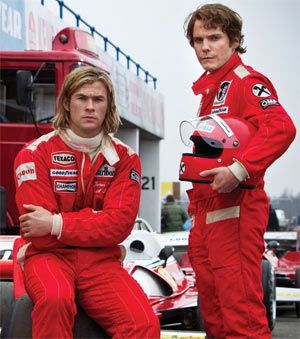 | « Back to article | Print this article |
 According to Raja Sen, Rush is a rousing, thrilling film.
According to Raja Sen, Rush is a rousing, thrilling film.
Formula One has the habit of making other sports look absurdly insignificant.
What, you run real quick? What, you flog a bit of leather? What, you hit another bloke in the face?
Well, I battle gravity and push physics to the limit by hurling myself at the apex of a curve, calculating and strategising about the car behind me, braking crucially late while knowing full well that I could careen into a rival inches ahead of me, and shatter a chassis or two or a neck or two.
Comparisons will forever appear laughable, but not quite as much as when Formula One was bloodsport, days when -- as Niki Lauda says in Rush -- two out of 25 drivers died every year.
Those insane statistics nutshell the relentlessly, giddily gladiatorial sport F1 had become in its quest to straddle speed and danger, and even by that unacceptable norm, 1976 was a particularly dramatic year.
So dramatic, to be precise, that one would be forgiven for thinking Ron Howard’s film, set around that year’s Formula One World Championship season, is fictional.
But sport is where fact often leapfrogs the imagination, when true human conflict supersedes acceptable writing. Where we only suspend our disbelief because we’re told all that’s happening on screen, no matter how preposterous, has its roots in reality.
You couldn’t find more diametrically opposed racing drivers than the technically proficient Austrian great Niki Lauda, and swinging, Union Jacking superstar James Hunt.
Lauda was one of the first drivers who understood the importance of aerodynamics, and revered for his excellent understanding of a car’s limits. Hunt was the definitive F1 playboy, a man with the badge “Sex: Breakfast Of Champions” sewn onto his overalls, a lad who’d gargle champagne before winning races.
In 1976, these rivals put daggers between teeth, stared death in the face and lived to finish the tale.
Ron Howard’s film is written by the infallible Peter Morgan, the playwright and screenwriter who fashions known historical facts into riveting narratives so laden with plot they’d make George RR Martin jealous.
The two had worked before on the astonishing Frost/Nixon, but armed with this much deliriously cinematic meat, they go one better.
This is a Scorsese-worthy story, and Howard rises to the moment and does it justice. Rush is not just the best film of Ron Howard’s career -- a rip-roaring smash about a great human story and two damn fascinating men -- but among the finest sports films in modern cinema.
The casting is spot-on, with Chris ‘Thor’ Hemsworth playing the frequently unzipped Hunt and Daniel Bruhl of Inglourious Basterds as the nearly-Vulcan Lauda.
Both actors are in exceptionally fine form. Hemsworth gets the swagger right, Bruhl masters that accent, and together they bring to life an intensely passionate rivalry. (To be fair, it is a bit exaggerated. The two fought on the track but never loathed each other like the film showed; by all accounts, their’s was a relationship of competitive respect. But then again, Hunt did always say Lauda looked like a rat.)
The racing action is brilliant, with inventive cinematographer Anthony Dod Mantle fitting cameras into peculiar crevasses in the vintage chassis.
The viewer is forced closer to the action -- and much, much closer to that Sherman Tank of an engine -- than television can allow, and the results are dizzying.
You do not have to be a fan to love this film, though a fan would derive much pleasure by seeing the doppelgangers cast in important smaller roles, like that of Enzo Ferrari or Clay Regazzoni. (The finest supporting actor here is Christian McKay as the memorable Alexander Hesketh, a whimsical team-owner who introduced the F1 pitlane to oysters and caviar, and a man worth a movie all his own.)
The acting is top-notch all around, and the women -- Alexandra Maria Lara, Natalie Dormer and Olivia Wilde -- up the film’s stakes considerably.
For there is so much more to this film than racing.
There is a whole lot of sex: on the most important day of his career Hunt is shown waking from a Japanese hotel bed with two pairs of feet flanking his own. And then there’s even more insight: Hunt prepares for a Formula One race by lying down with his eyes closed, visualising the Monte Carlo grand prix circuit in pre-simulator times; Lauda learns that no woman can rev up an Italian man’s motor quite like a Ferrari driver can.
There are even exquisite details for fans of motorsport history, including quotes that have since become legendary, and women even more so. Also, Hunt’s beloved budgerigars make an appearance.
Don’t look up 1976, don’t look up file footage, just go watch this rousing film. And then get a hold of the BBC documentary, F1’s Greatest Rivals: Hunt vs Lauda so you can watch the real men and marvel at how perfectly Morgan and Howard took the story and ran with it.
Many years ago, John Frankenheimer’s 1966 stunner Grand Prix cemented my then-fledgling love for motorsport, and now Howard has, at long last, created another film evocative enough to ignite pitlane-passion in hearts that haven’t yet thumped for Formula One.
Rush is a film about a racing season -- and two seasoned racers -- so damned thrilling that it would compel the most stubborn Formula One hater, those people who insist mastering technology isn’t a sporting enough achievement and forget every other part of the invariably human equation.
For the Formula One fan, this is a film worthy of a magnum of Mumm’s finest champagne -- if only for the chance to hear those massive V12 engines explode across the big screen. VrrrRRRRRRooom.
Rediff Rating: 